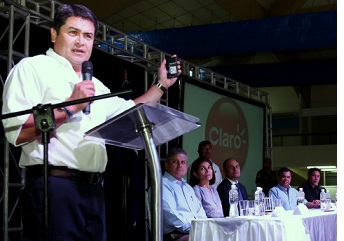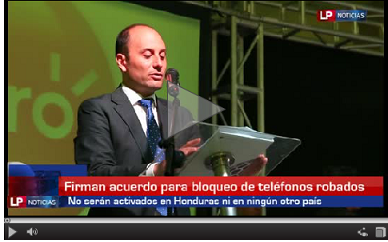The president of Honduras, Juan Orlando Hernández, have signed a memorandum of understanding with the GSMA Latin America, Honduras’ National Telecommunications Commission (Conatel) and the three mobile network operators of the country. Following this agreement, stolen mobile devices will be reported and black listed in GSMA’s IMEI database.
 Mobile network operators have committed to voluntarily exchange IMEI (International Mobile Equipment Identity) information of devices reported as stolen. The goal is to reduce crimes related to devices theft that have recently spread across the country. Similar measures have been taken throughout the region making hard to register a stolen device in another country where mobile operators are connected to the GSMA IMEI’s database.
Mobile network operators have committed to voluntarily exchange IMEI (International Mobile Equipment Identity) information of devices reported as stolen. The goal is to reduce crimes related to devices theft that have recently spread across the country. Similar measures have been taken throughout the region making hard to register a stolen device in another country where mobile operators are connected to the GSMA IMEI’s database.
The agreement has been signed on March 27th in Sand Pedro Sula where the President of Honduras, along with Sebastián Cabello (GSMA LA Director), Otto Pineda (Tigo’s General Manager), Froylan Ayón (Claro Honduras’ Manager), Ricardo Cardona (Conatel’s President), and Jesús Mejía (Hondutel’s General Manager) took part of the event.
During the ceremony, Mr Hernández pointed: “Sadly, in many occasions the life of a human being has been threatened because of mobile phone theft. However, with this agreement there will be no incentive for stealing or taking someone´s life for a mobile. Now the people need to know where to call in order to block stolen mobile devices and protect Hondurans life’s.”
For his part, GSMA Latin America director said: “Mobile services growth and devices sophistication have become a major security issue for users –some of which have a tragic outcome– and has served for setting up criminal actions. That is why this agreement celebrated in Honduras has been a very significant development.” After the agreement, Cabello stressed out that these measures will require 1) rising people awareness on reporting stolen devices; 2) developing clear sanction’s rules for those who altered devices’ IMEI; and 3) involving mobile phones manufacturers to make less vulnerable devices.
 Froylan Ayón, General Manager of Claro Honduras, highlighted: “In Claro we have a genuine commitment with Honduras. We support these initiatives because they are aligned with our principles. They are, indeed, good news for Honduran people.”
Froylan Ayón, General Manager of Claro Honduras, highlighted: “In Claro we have a genuine commitment with Honduras. We support these initiatives because they are aligned with our principles. They are, indeed, good news for Honduran people.”
At the same time, Tigo’s General Manager, stated: “we already know the impact of criminal acts committed against mobile phone owners in our country. That’s why we encourage the efforts made by the government to protect the people. For that reason, we are constantly investing in technology to monitor and control that black listed mobile phones are kept away from our network.”
The main Latin America mobile network operators have agreed to collaborate with governments among the region in order to reduce crimes related to mobile phones theft. Countries like Guatemala, Colombia, Ecuador, and México where NMOs have agreed to connect their IMEI databases have experienced a reduction on devices theft’s figures. At the moment, there are 48 MNOs connected to IMEI black list of 16 countries around the continent. Around the world there are, in total, 111 NMOs connected on 41 countries.
The GSMA’s IMEI database is a unique system that allocates basic information on the serial number (IMEI) ranges of millions of mobile devices (e.g. mobile phones, laptop data cards, etc.) that are in use across the world’s mobile networks. By sharing black listed IMEIs information connected MNOs are able to prevent stolen mobile devices to work on another networks. This initiative seeks to protect mobile phone users and no personal details –like phone numbers or addresses– are held on the database.